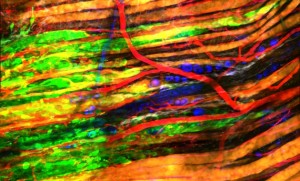Intercellular Interactions in Context: Towards a Mechanistic Understanding of Cells in Organs
Organisers: Andrew Ewald, Peter Friedl and John Wallingford
Date: 5th - 8th February 2017
Location: Wiston House, Steyning, West Sussex, UK
Mammalian cell biology at present is split between two camps: one of which values precision in molecular perturbation and analysis with focus on experimental well-defined 2D settings and the other which values 3D tissue context most and accepts a diminished molecular tool kit in exchange for increased physiologic relevance. A third strategy has been to exploit the power of genetically tractable and optically transparent model systems to elucidate fundamental molecular pathways and cellular processes in (for example) Drosophila and then seek to validate the resulting concepts in mammalian systems. This Workshop aims to bridge the gaps between these experimental strategies and reach “multi-scale” molecular understanding of how cells build organs during development and corrupt their structure and function during disease processes. As key themes, we will focus on the areas of cell adhesion, cell migration, and tumor cell biology and integrate 2D and 3D culture technology for enabling mechanistic cell biology within tissues, including organoids and alternate approaches to 3D cell culture.
Specific goals and themes:
- Adoption of novel techniques (3D culture, microdevices, imaging, biosensors) into cell-cell adhesion and migration reseach
- Novel tools for gene manipulation and molecular analysis in 3D culture and in vivo.
- Combinatorial approaches to probe molecular and physical cell functions in tissue environments
- Translate lessons from basic cell biology to complex models of morphogenesis and cancer
- Bridge between models and results by computational biology / bioinformatics
This workshop will bring together experts in molecular cell biology, biophysics, developmental biologists, microscopists, engineers and experts in optical sensor technology to highlight cutting-edge in vitro and in vivo strategies to address mechanisms of complex cell functions.
This proposed conference aims to provide insight into functional cell biology and basic mechanisms of disease research, develop new directions for investigation and forge new collaborations and interactions across multiple disciplines. Sufficient time for discussion and informal interactions will be provided.
The Company of Biologists’ Workshops only take place three times per year, on topics that are driving forward the progress of life sciences and biomedical research. The meetings are small and intensive, taking place over 3 days with 20 invited participants, all of whom we ask to make a presentation, and a further 10 chosen from submitted applications (students and postdocs as well as junior PIs). A condition of attendance is that you are present for the full meeting, from Sunday lunchtime through to Wednesday lunchtime.

3D multi-channel imaging and movies of cancer cells in living mice show how streams of melanoma cells (green) invade skin tissue. The cells are guided by structures such as muscle fibres (orange), nerve fibres (blue), collagen (grey) and blood vessels (red). Image courtesy of Bettina Weigelin and Peter Friedl, Radboudumc, The Netherlands.
Organisers & speakers
Peter Friedl Radboud University, The Netherlands
John Wallingford UT Austin, USA
Scott Fraser University of Southern California, USA
Darren Gilmour EMBL, Germany
Anne Grapin-Botton University of Copenhagen, Denmark
Johanna Ivaska University of Turku, Finland
Karen Liu King’s College London, UK
Laura Machesky University of Glasgow, UK
Celeste Nelson Princeton University, USA
Carien Niessen University of Cologne, Germany
Elke Ober University of Copenhagen, Denmark
Erik Sahai The Francis Crick Institute, UK
Benedicte Sanson University of Cambridge, UK
Paul Timpson Garvan Institute of Medical Research, Australia
Michael Way The Francis Crick Institute, UK
Valerie Weaver University of California, San Francisco, USA
Cornelis Weijer University of Dundee, UK
Alpha Yap The University of Queensland, Australia
About Wiston House

The Workshops will be held at the beautiful Wiston House, which is a 16th Century Grade I listed building located at the foot of the South Downs in West Sussex. The House is surrounded by over 6,000 acres of parkland with magnificent views from the mile-long drive.
Wiston House is one of the world’s leading centres for the discussion of key international policy issues. It was created in 1946 to help re-establish peace and democracy in Europe as part of an initiative inspired by Winston Churchill. Wiston House has an amazing history and appears in the Domesday Book, the register of English possessions made by William the Conqueror in 1086, 20 years after he won the Battle of Hastings.
Wiston House is 32 miles from Gatwick Airport and 60 miles from Heathrow Airport. The nearest train station is Shoreham-by-Sea, which is a 20 minute taxi ride from Wiston House and takes 1 hour 10 minutes from London Victoria.
Wiston House
Steyning Road
Steyning
West Sussex
BN44 3DZ
Tel: +44 (0) 1903 815020
www.wistonhouse.co.uk








You must be logged in to post a comment.